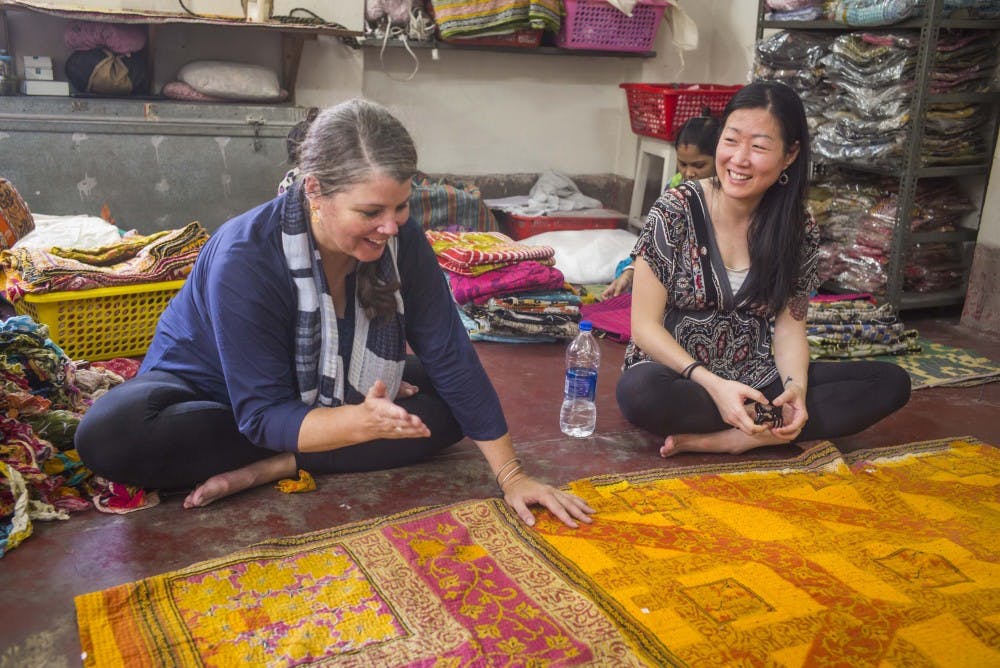The University of Portland has been selected as the partner university for the 2018 Opus Prize Foundation award. Six UP students will have the opportunity to go on site visits in the spring of 2018 to select the recipient of the 2018 award. The Opus Prize is a yearly award that recognizes the contributions of people around the world who work for social change. It chooses one Catholic university a year to partner with to select recipients.
The foundation partners with Catholic universities to identify “unsung heroes” who work to better their communities. It awards one prize of one million dollars and two prizes of $100,000 to individuals engaged in humanitarian efforts. Though the organization works with Catholic universities, individuals or organizations that receive the award can come from any faith background.
The 2017 Opus Prize laureate is Sister Marilyn Lacey. She founded the organization Mercy Beyond Borders to offer opportunities to girls and women living in extreme poverty in South Sudan and Haiti.
Dan McGinty, the director of the Dundon-Berchtold Institute for Moral Formation and Applied Ethics on-campus, described the process in four steps. First, the steering committee that he leads will contact UP alumni and friends of the university to field nominations for the prize, he said. The committee will ask its network of alumni and friends to choose people who inspire them through their humanitarian efforts, especially people who do not receive a lot of recognition for what they do, McGinty explained.
“There’s a heavy premium on the person being an unsung hero — someone who’s in the trenches, a person who is fighting the good fight,” McGinty said.
The committee will then identify people in the Portland area, from fields such as technology, business and social services, to partake in the Opus Prize jury. The jury will narrow down the nominations to three finalists, McGinty said.
At the same time the committee is forming, students will be encouraged to apply to participate in site visits to evaluate these nominees in the spring. Applications are due on Oct. 31. Six students will be chosen, and groups of two (along with a professor) will visit each of the nominees and give their reports to the Opus Prize Foundation board, McGinty said.
The final step of the process will take place in November, 2018, when the three finalists visit UP, McGinty said. The aim is for the campus community to get to know them through their discussion of service and social issues. He explained that the Opus Prize Foundation aims to inspire change in others through having the nominees visit the campus.
The applications to be one of the six students to participate in site visits are open to all students and are not limited by major, and students can be of any academic year as long as they won’t be studying abroad or have graduated by spring and fall semesters of 2018, McGinty said. The committee is looking for students from all backgrounds and does not prefer those who have volunteered extensively or not at all, McGinty said. They will need to be UP students at the time they go on the site visits in spring 2018 and when they will welcome the finalists to UP in fall 2018 during Opus Prize week.
“We know that the students who go on these trips will have prime public speaking opportunities during the course of Opus Prize week,” McGinty said. “We want students who will be present with people when they go on these site visits but also then to have the empathic ability to go ahead and just share that reflectively with other people.”
Chris Lew is a graduate student in physical therapy at Regis University and a UP alum who partook in a site visit to Haiti when Regis was selected as the 2017 partner university. He described his site visit to Mercy Beyond Borders as determining whether or not the organization was a good fit for the Opus Prize and providing a recommendation to the board. He also said he thinks that UP instills a commitment to service in its students.
“UP is really intentional about the way they help people grow in their understanding of service and learning. I think UP gave me a good foundation for understanding what social justice means,” Lew said.
Dan Neureuther, the executive director of the Opus Prize Foundation, said that the foundation partners with a different university each year so that each school will use its unique culture and network of alumni and friends to bring a distinct touch to the types of individuals and organizations who are nominated. The foundation was drawn to UP because of what he characterized as its dedication to service, Neureuther said.
“With the great commitment that the university has to service and to really promoting service opportunities for students, that was very attractive to us,” Neurether said. “The leadership of the university understanding that this is a great opportunity for UP and for the city of Portland (was also a factor),” Neureuther said.
McGinty said that he believes UP’s participation in the Opus Prize Foundation is an excellent way to honor the stories of those who toil to improve and that it aligns well with the university’s values.
“One of the reasons I think this is perfect for the University of Portland is that we are really interested in trying to empower young people to utilize their unique gifts, talents and abilities to impact and influence the world in good and positive ways,” McGinty said. “I think so much of what UP is already about is just woven into the fabric of what the Opus Prize stands for.”








